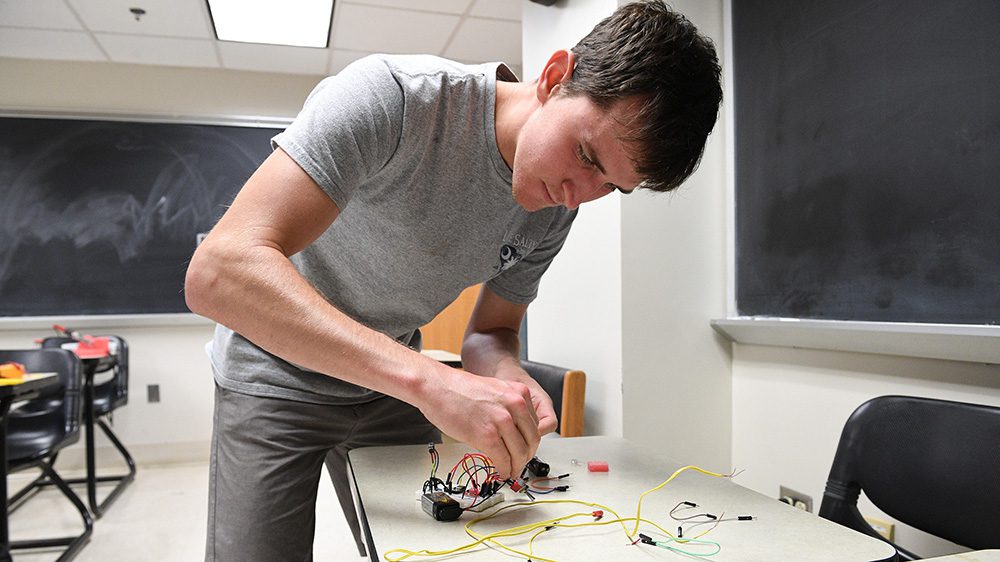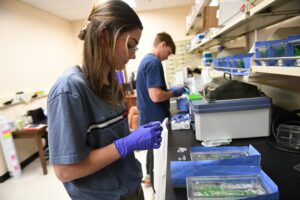Pickford ’24 and Tavenner ’25: SURI Highlights

Cadet Brian Tavenner ’25 works on the electrical components of a rocket.—VMI Photo by Kelly Nye.

Cadet Brian Tavenner ’25 works on the electrical components of a rocket.—VMI Photo by Kelly Nye.
The Summer Undergraduate Research Institute is a program where the cadet, as the principal investigator, conducts research directly with a faculty mentor. Cadets engage in in-depth research with their faculty mentor for either a five-week or a 10-week experience, earning a scholarship and a room and board stipend. SURI has sponsored guest speakers, library instruction, and skill development sessions such as writing a project proposal, adding research to a resume, and how to write a research abstract.
SURI is one program made possible by the VMI Center for Undergraduate Research. The mission of VCUR is to promote and facilitate faculty-mentored undergraduate research and foster the development of a culture of undergraduate research at VMI. VCUR operates on the premise that some of the most enduring, meaningful academic experiences of college students come through opportunities to be mentored one-on-one by faculty outside the classroom while also believing in the merit of research and other inquiry-based experiences within a more traditional classroom setting. In addition to SURI, other VCUR programs include an annual Undergraduate Research Symposium held on post, cadet travel grants to present at professional meetings or to conduct research in the field, and funding for cadet academic year research.
Cadet Ellie Pickford ’24 stood before a small glass tank, peering intently at the colorful Betta fish swimming within. Her summer research project was well underway, and she was determined to unlock the mysteries behind the interactions between nicotine and antidepressants.
Pickford had chosen this field of research to fuel her passion for psychiatry and neuroscience. She believed that understanding the effects of nicotine and antidepressants on the brain could have a profound impact on the treatment of mood disorders.
With a planned future as both an M.D. and a Ph.D. holder, Pickford knew that the Summer Undergraduate Research Institute at VMI was a valuable opportunity. It allowed her to work closely with her professors, building relationships that would guide her future endeavors.
“I am forming much stronger relationships with my professors than I could possibly during the regular school year,” said Pickford. “I am able to perform fully funded research that directly relates to—and hopefully helps me reach—my future educational and career goals.”
Her project aims to shed light on the interactions between nicotine and commonly prescribed antidepressants, such as fluoxetine, or Prozac, and the effects on individuals who use both substances.
Using Betta fish as a model organism, Pickford is investigating the impact of nicotine on aggression levels and brain chemistry, ultimately hoping to contribute to a better understanding of psychopharmacology.
The statistics Pickford cites are staggering—80% of adult smokers started during adolescence, and adolescents who smoke daily have a 70% occurrence of psychiatric disorders, with higher rates of comorbidity in adulthood.
Armed with this knowledge, Pickford recognizes the urgency of understanding the effects of nicotine in conjunction with antidepressant use. Her research aims to contribute to the development of more effective treatment strategies and interventions for individuals struggling with mental health disorders.
The SURI program, offered by the VMI Center for Undergraduate Research, provided her with a fully funded research experience that directly related to her educational and career goals.

For her Summer Undergraduate Research Institute project, Ellie Pickford ’24 studied interactions between nicotine and commonly prescribed antidepressants, such as fluoxetine, or Prozac, and the effects on individuals who use both substances.—VMI Photos by Kelly Nye.
The “s” in SURI stands for summer, but Pickford’s research began long before her program. “I began dedicating time to this project before the academic year ended because the first group of 20 fish arrived in the lab,” she said. “Since then, I have been in the lab every single day—checking on the fish and feeding them.”
Immersed in the labs of Maj. Molly J. Kent, Ph.D., and Maj. Mary Beth Manjerovic, Ph.D., both assistant professors in the Department of Biology, Pickford not only worked on her project but assisted with other ongoing research. This exposure deepened her understanding of biology and expanded her knowledge of scientific inquiry.
As the days turned into weeks, Pickford’s dedication to her research grew stronger. The structured life of barracks was replaced by the independent existence of an adult.
“I am learning how to live as an independent adult—managing finances, my own time, groceries, and everything else that comes with living in the ‘real world.’”
For Pickford, collaborating with like-minded individuals fueled her passion for research and scientific discovery. She knew that these relationships and the research experience she gained would be invaluable for her resume and future higher education applications.
“I hope to expand my relationships with the various mentors in the biology department … with professors, as well as fellow cadets,” said Pickford.
When the end of Summer Session I approached, Pickford’s focus intensified. She aimed to perfect her research and meticulously analyze the results well after the SURI program concluded. The data she’s gathered will form the foundation for her honors week thesis and senior capstone, fulfilling the requirements of the Institute Honor Scholars Program and her biology degree.
Through her dedication, Pickford was not only gaining insights into the effects of nicotine and antidepressants but also solidifying her path toward becoming a compassionate psychiatrist and a knowledgeable neuroscientist.
She dreams of applying her research findings to help her future patients—by providing them with the best possible care.
As the Betta fish continue to swim in their tanks, unaware of the significant role they played in advancing medical knowledge, Pickford remained steadfast in her pursuit of understanding the complexities of the human brain.
The SURI program opened many doors for Pickford—allowing her to explore her passions, grow as a researcher, and make a lasting impact on the world of psychopharmacology.
Rockets have existed since the first century. In ancient China, they were first used to create explosions during religious festivals, then later used for warfare. In modern times, they are used for fireworks, space exploration, human spaceflight, and to launch satellites into orbit.
Cadet Brian Tavenner ’25, an electrical and computer engineering major, designed and built a fiberglass rocket to reach the exact height of 1,023 feet using a F-engine motor in his five-week Summer Undergraduate Research Institute project titled, “Target Altitude Project.”
Tavenner chose the research project in order to enhance his engineering skills, including electrical and mechanical design, documentation, construction, and debugging. In addition, he wants to lay the foundation for a VMI rocketry club to compete with other colleges. According to Tavenner, many major colleges and universities including The Citadel, MIT, and Georgia Tech sponsor student-led rocketry clubs as chapters of the National Rocketry Association. “I propose to create a high-power rocketry club for VMI and lead a team to enter a rocket combination competition in the annual national intercollegiate Battle of the Rockets, Target Altitude Event,” he said. The height of 1,023 is a requirement of the competition to be held in April. The team with the closest altitude to 1,023 wins.
Tavenner pointed out that all the measurements in the design of the rocket must be perfectly accurate to achieve the specific height. “Even if it’s off just a little bit, it just won’t work. It must be perfect. The hard part is determining how much higher the rocket will glide up on its own once I stop the engine and the nose cone has popped off. That will require a lot of test flights,” he said.
Tavenner graduated from Midlothian High School just outside of Richmond, Virginia. He is a NCAA long-distance track and cross country runner, plays the viola in the strings club, and studies Japanese independently through online courses. Tavenner is part of a large STEM family legacy at VMI. He is the son of Andrea and James Tavenner ’91, who majored in math and played baseball for VMI. His two uncles, Cloyd Tavenner ’88, an electrical engineering major, and Dave Tavenner ’03, a history major, as well as his two brothers, Jamie Tavenner ’16 and Thomas Tavenner ’19, who both majored in civil engineering, are all alumni. His cousin, Molly, will matriculate with the Rat Mass of 2024+3.
Editor's Note: Story originally published by Virginia Military Institute.
Editor's Note: Story originally published by Virginia Military Institute.